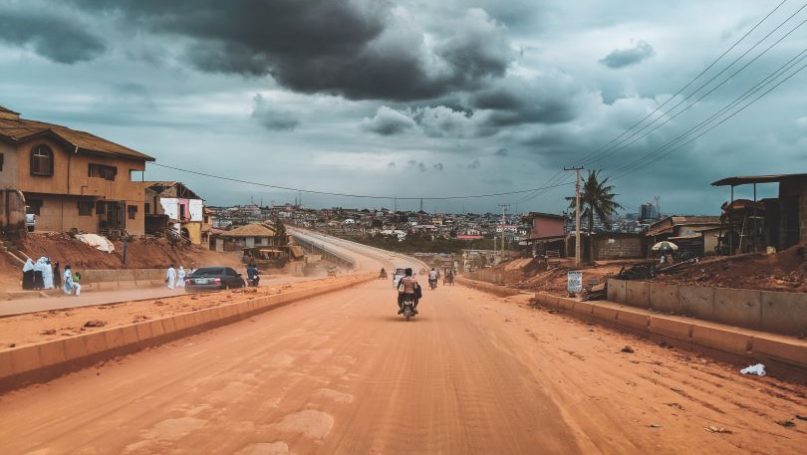
Nigeria, like most developing countries has continued to witness the negative social, economic and political impacts of climate change. It is difficult to establish a link between climate change and violent conflicts. However, the persistent farmer-herder conflict in Nigeria is often seen as consequences of shortages of resources like land and waters caused by climate change (Alaanuloluwa Ikhuoso et al., 2020). Further, climate change is adversely affecting food security in Nigeria, and with about 70 percent of Nigerian households engaged in agricultural activities, something urgent must be done to mitigate the impending crisis. Any attempts to mitigate further climate change crisis will depend on collective contribution and collaboration of all countries of the world including Nigeria. In 2015, Nigeria was the second highest emitter of greenhouse gases after South Africa, and the production of oil and gas in the country has been linked to steep environmental disasters and social inequalities (Elfredah, 2020). This means that both developed and developing countries must effectively contribute to the fight against climate change.
However, Nigeria being the eight largest suppliers of oil in the world has a mostly monoculture economy with about 80% of government income coming from oil revenue. This means that attempts by Nigerian state to contribute to the fight against climate change might negatively impacts government revenue which in turn affects state`s capacity to manage existing climate change challenges. In other words, on the one hand, Nigerian economy is deeply tied to oil revenue. On the other hand, the Nigerian state has continued to suffer from climate change causing socio-economic and political crises. However, it is not uncommon for environmental protection and economic growth to be seen as competing aims. Indeed, in short terms, policies that protect the environment and those aimed at achieving economic growth are often portrayed as conflicting (List & Kunce, 2000). At the basic level, this means that if Nigerian governments were to manage the environmental crisis and its attendant socio-economic and political crises, it would have to reduce its dependency on oil revenue which could affect state`s capacity to achieve economic growth and create jobs.
What do Nigerians think about this climate-economic conundrum? What explains the choices between economy and the environment? For many years, studies on climate change in Nigeria have focused on the negative impacts of global warming on the Nigerian society with specific emphasis on its social, economic and political consequences (Edeh et al., 2014; Emodi & Ekene, 2016; Ezegwu, 2014; Sayne, 2011). Other studies have looked at the direct linkage between climate change and violent conflicts in Nigeria (Adejobi & Fatile, 2012; Alaanuloluwa Ikhuoso et al., 2020; International Crisis Group, 2020). However, few studies have explored the contradictions between negative impacts of climate change in Nigeria and Nigeria`s oil economy with its environmental degradation capacities. And more importantly, few studies explore what Nigerians think about the dilemma of choosing between environmental protection and economic growth. In this study, I examine climate-economic considerations in Nigeria. The primary objective is to analyze the factors that influence choices between environmental protection and economic growth. To analyze the factors influencing choices between economic growth and protection of the environment in Nigeria, I rely on binary variable of environment-economic consideration available in the 7th wave of the World Values Survey (WVS) conducted in 49 countries including Nigeria between 2017-2021. The results of the analysis show that income has a positive relationship with choice of economic growth. That is, the higher the level of income of an individual, the increase in the likelihood of supporting economic growth against environmental protection. Secondly, though individuals with right wing political orientation will likely support economic growth against environment protection, this relationship was not statistically significant. In other words, there is no statistically significant relationship between left-right political position and environment-economic consideration.
Theory
Climate change is one of the defining challenges of the 21st century that has generated intense debates and controversies among governments, academics and policy makers. Scholarly discussions on climate change and economic growth have often focused on the negative impacts of climate change on economic growth and development. There are increasing theoretical and empirical evidence on the extent and nature of the damages of climate change on the economy. Climate change as we know it causes the destruction of the ecosystems through flood, drought, as well as deaths of animals leading to permanent damages to the society. Furthermore, the resources used in managing the challenges of global warming could have otherwise been invested in economic, infrastructures, and research and development (Ali, 2012; Pindyck, 2011). Studies by (Dell et al., 2012), using a panel of 136 countries from 1950-2003 found climate change (1°C) to have reduced economic growth in developing country by 1.3 percentage points. According to the study, higher temperatures due climate change also have wide-ranging effects including reducing agricultural and industrial output and also increasing political instability (Dell et al., 2012).
For many years, developed countries have behaved more irresponsibly towards the environment (Bowen et al., 2012; Reddy & Assenza, 2009). Nonetheless, research has shown negative impacts of climate change to be more devastating in developing countries than developed countries (Bowen et al., 2012; World Bank, 2010). This is because most economies in developing countries rely heavily on agriculture which is highly sensitive to climate change. Additionally, developing countries have less adaptive capacities to cope with the negative consequences of climate change compare to developed countries (Bowen et al., 2012).
Existing studies on climate change in developing countries focus on the challenges of climate change as well as policy responses of developing countries to these challenges. Reddy & Assenza (2009) in their studies on developing countries` perspectives on climate change, argue that market-based response is the best policy response of developing countries to climate (Reddy & Assenza, 2009). By this, they mean that developing countries should focus on their development priorities first before any climate change considerations. This argument was further supported by (Maikasuwa, 2013) who suggests the introduction of holistic and pragmatic responses that meet the realities of the developmental needs of the people living in developing countries. According to Maikasuwa (2013), “it is more compelling and desirable for developing countries to adopt policy frameworks that will respond to their domestic exigencies first before those of the international system. It is therefore strongly suggested that environmental policies must be people-friendly, people-centred and people-driven”.
This paper will build on this literature by examining what Nigerian people mostly think about climate change and economic considerations. Though studies focusing directly on this subject are limited, there are enormous body of knowledge with focus on population perception of climate change in relations to their livelihoods. For example, a study by (Elum et al., 2017) examines farmers` perception of climate change in South Africa. The studies reported negative perception of climate change by farmers in South Africa though many of these farmers developed various climate-response strategies including planting of drought-tolerant crops. Another study by (Haque et al., 2012) on perception of Bangladeshis to climate change reported clear perception of climate change among the participants which included increased heat, overall warmer winters, reduced rainfall. More importantly, the studies reported negative perception of climate change in terms of its effects on means of living, human health, agriculture and overall livelihoods. This finding was also confirmed by another study by (Kais & Islam, 2019) which focuses on shrimp-farmers in coastal areas of Bangladesh. The studies reported that local shrimp-farmers associated climate change to increase frequency of extremes events like cyclones and storm surges as well as with temperature increase which threatened their traditional sources of livelihood and their quality of life.
With different objectives, a study by Chou (2013) focuses on citizens` attitude towards the choices between economic growth and environmental protection. It also explores citizens` perception of climate change risk and the ability of the government to manage the risk. Concerning the dilemma between environmental protection and economic growth, about 69% of the participants in the studies did not think environmental protection can hinder economic growth (Chou, 2013). In other words, they believe that both environmental protection and economic growth can co-exist together. A similar study by Begum and Pereira (2015) among corporate managers in Malaysia reflect a much positive perception of environmental protection in relations to economic growth. Though the participants noted the likely negative impact of climate change on their companies` profits, more than 95% of them believed that climate change would have no effect on the economy of Malaysia (Begum & Pereira, 2015).
Further studies have also focus on the attitude towards climate change in times of severe economic challenges. That is, what do people think about climate change when there is economic meltdown. For example, a study by Papoulis and co-authors (2015), examine the attitude of citizens of Greece towards climate change during severe economic crisis. According to their findings, though citizens of Greece were aware of climate change, they did not have confidence in the ability and capacity of the government to address climate change in a way that will also protect the economy.
These studies above mostly document citizens` perception of impacts of climate change and they lacked predictive capabilities of factors influencing negative or positive perception of climate change in these countries. Many of the studies also failed to consider the dichotomy between environmental protection and economic growth. However, available studies with objective closer or similar to this mostly focused on western developed societies (Egan & Mullin, 2012; Hamilton, 2011; McCright & Dunlap, 2011). Their analyses show that right-wing political orientation are mostly favourable towards economic consideration as against environmental protection. For example, a study by (Ziegler, 2017) examines the factors that influence climate change beliefs and altitudes in Germany, The US and China. Though the study reported significant influence of political orientation on climate change beliefs and altitudes, it was less impactful than environmental values measured using New Ecological Paradigm (NEP) scale in predicting attitudes and beliefs to climate change. Nonetheless, US and German citizens with right-wing political orientation expressed significantly less support for publicly financed climate policy.
With slightly different objective, a comprehensive cross national study by (Knight, 2016) examine perception of climate change risks across different countries while focusing on factors that influence negative or positive attitudes toward climate change. According to the findings of the study, citizens of wealthier and highly educated countries tend to be more aware of climate change. However, the studies found no conclusive evidence on the influence of political orientation and vulnerability to climate change on negative or positive attitudes toward climate change. The study also reported inconsistent results regarding the influence of unemployment and level of education on climate change risk awareness.
Though these studies focused mostly on western societies, they provide basic explanation of factors that influence climate change awareness and positive or negative attitudes towards climate change. Along the same line, though focusing on a developing country, Nigeria, this current study attempts to document the influence of political orientation on the choices between environmental protection and economic growth. Based on findings of existing literature, I expect that right-wing political orientation will favour economic growth against environmental protection. I therefore hypothesize that:
H1: right-wing political orientation favours economic growth against environmental protection.
Further studies have discussed the role of income or inequalities on citizens perception of impact of climate change. On the one hand, evidence has shown that poor members of the society are likely to be more negatively impacted by climate change while also decreasing their ability to cope with negative impacts of climate change (Intergovernmental Panel on Climate Change, 2014; Islam & Winkel, 2017; Skoufias & Bank, 2012). On the other hand, rich member of the society or citizens of wealthier countries tend to downplay the risk of climate change compared to the citizens of poor countries or poor members of the society (Lo & Chow, 2015; McCright & Dunlap, 2011). This is because adequate economic resources possibly provide sense of security and protection against environmental crises. Given this reality, I expect that individuals with high income in middle-income countries like Nigeria will favour economic growth against environmental protection. I hypothesize that:
H2: high income earners or high level of income will favor economic growth against environmental protection.
Methodology
This study uses a survey data sourced from 7th wave of the World Values Survey (WVS) conducted in 49 countries including Nigeria between 2017-2021. About 50 countries around the world participated in the 7th wave of the survey with more than 70, 000 respondents and it is latest data available as of April 4, 2021. Essentially, the World Values Survey asks citizens of participating countries their opinions on issues relating to politics, democracy, governance, international politics as well as different socio-demographic questions. The survey data for Nigeria was collected in 2018 and it contains 1, 237 participants selected through random probability representative samples. In the country documentation focusing on Nigeria, there were interesting questions specifically focusing on climate change and economic growth. One of them, used for this analysis asked respondents if they (a) think protecting the environment should be given priority even if it causes slower economic growth and some loss of jobs or (b) economic growth and creating jobs should be the top priority, even if the environment suffers to some extent. This makes a binary variable of environment protection-economic growth.
My objective is to know the predictors of the choices between environmental protection or economic growth are, therefore, I used this binary variable of environment protection-economic growth as my dependent variable in two logistic regression analyses. My first model examines the influence of left-right placement on environment protection-economic growth. The left-right placement variable varies from 1 to 10 with 1 corresponding to complete left placement and 10 corresponding to complete right placement. My second model retains the binary dependent variable of environmental protection or economic growth and I explored the influence of level of income on the choices between economic growth and environmental protection. The level of income variable varies from 1 (lowest income group) to 10 (highest income group).
In the two logit regression models, I controlled for the following variables: age, education attainment level, religion, ethnic group and gender, sex, place of residence (urban or rural) . The age variable ranges from 18 years to 70 years with a mean age of 32 years. The education attainment level variable moves from no education to Master or equivalent education. The Religion variable includes major religious groups in Nigeria: Roman Catholic, Protestant, Muslim and other types of Christian denominations. Gender variable was a binary variable of male and female.
Discussion of Results and Analysis
Environmental Protection and Economic Growth
The first important finding from our analysis is the respondents support for environmental protection or economic growth. As presented Table 1 (See Appendix), about 41% of the total respondents reported support for environmental protection even if it causes slower economic growth and loss of jobs. More than have of the respondents (57%) reported support for economic growth even if the environment suffers as a result of it. Only about 2% of the respondent did not answer the question or don’t know the answer. This demonstrates that on average, for many Nigerians, there is a slightly more support for economic growth against environmental protection.
Environment-Economic and Left-Right Political Orientation
The results of the first logistic regression analysis in Table 2 and Figure 1 (See Appendix) reveal that the relationship between environmental protection versus economic growth and left-right position is not statistically significant though there is a positive relationship. As left-right position moves from left to right wing position, the likelihood of supporting the economy against the environment also increases. The figure 1 showing the predicted probabilities of environment-economic as a function of left-right position (See Appendix) reveals that an individual with right wing political orientation has about 48% (0.485) probability of supporting economic growth against environmental protection. While an individual with the left wing political orientation has a little over 41% (0.41) probability of supporting economic growth against environmental protection. Further, as individual moves from left wing to right wing, the probability of supporting the economy against environmental protection also increases (Figure 1). However, as seen in Table 2 (See Appendix), the relationship between environment-economic and left-right position is not statistically significant (P.V = 0.12), therefore, we accept the null hypothesis and reject the hypothesis that “right-wing political orientation favours economic growth against environmental protection”
These results did not confirm the hypothesis that right wing political orientation favours economic growth against environmental protection, hence the rejection of the hypothesis. However, the results show that those with right wing political orientation are likely to support economic growth (not statistically significant). Therefore, the results provide insight on what the relationship between political orientation and environment-economic consideration could be. Using different data set, it would be interesting if other research can further explore the relationship between political orientation and support for the economy against environmental protection in Nigeria.
Environment-Economic and Income
The results of the second logistic regression model show the effect of income on environmental protection vs economic growth. The model reports a statistically significant relationship between environmental protection vs economic growth and income (see Table 3 & Figure 2 in Appendix). As income increases, the likelihood of support for the economy against the environment also increases. As the predicted probabilities (see Figure 2 in Appendix) shows, an individual in the highest income level has about 49% (0.491) probability of supporting economic growth against environmental protection. While an individual in the lowest income level has a little below 42% (0.41) probability of supporting economic growth against environmental protection. This confirms the hypothesis that high income earners will favor economic growth against environmental protection. Nigerians within the highest income bracket are more likely to support economic growth ahead of environmental protection and as their income increases, the probability of supporting the economy also increases.
These findings expand on existing literature on the effect of income on environmental risk perception. As reported by Low & Chow (2015), rich members of the society in wealthier countries tend to downplay environmental risks. However, our findings show that rich people in poor or developing countries are also likely to downplay environmental risk or at least believe it is not as important as economic growth. These findings have important implications for environmental protection policies in societies like Nigeria. It means that any given environmental protection policies that negatively impact on economic growth or that is perceived to be negatively impacting on the economy maybe rejected by wealthier members of the society.
Diagnostic of Models
I conducted a McFadden model fit analysis. However, the results show that both models do not provide a good fit to analyze the variance of the dependent variable. Both models have a McFadden’s pseudo-r2 of 0.016 and 0.016, meaning that they each explain only about 1.6% of the variance of the dependent variable, environment-economy. Indeed, this is a very low measure, and it means the model did not do well. I cannot currently explain why the model has done badly especially given the fact I have included all independent variables that intuitively make sense in the logistic regression.
However, the model do not suffer from multicollinearity. A test of Variance Inflation Factor (VIF) reveals that none of the independent variables is above 1.2 (see Appendix). The smallest possible value of VIF is one (absence of multicollinearity). As a rule of thumb, a VIF value that exceeds 5 or 10 indicates a problematic amount of collinearity (James et al., 2013). Since none of the independent variables has VIF that is above 1.2, the models do not suffer from multicollinearity.
Conclusion
This study examines the perspective of Nigerians on climate change and economic growth considerations. Existing studies have focused on factors that influence perception of climate change risks especially in developed countries. With a slightly different objective, I examined the factors that influence choices between environmental protection and economic growth. The findings show that left-right political orientation does not have statistically significant relationship on environment-economic considerations, though right wing political orientation increases the likelihood of supporting economic growth against environmental protection thereby supporting existing literature. This means that there is no statistically significant evidence that left-right political orientation influences environment-economic consideration. However, further research can explore this relationship with another dataset.
The results of the second logistic model show that there is a statistically significant relationship between environment-economic and income. As income increases, the likelihood of supporting economic growth against environmental protection also increases. This finding has serious implication for environmental protection policies. At the basic level, environmental policies of government that threatens economic growth may not be supported by rich members of the society due to the fact that they are downplaying environmental risks. Or because they think the economy is just more important than the environment. Therefore, government must design environmental protection policies more carefully or in a way that does not threaten economic growth.
Appendix
A). Results

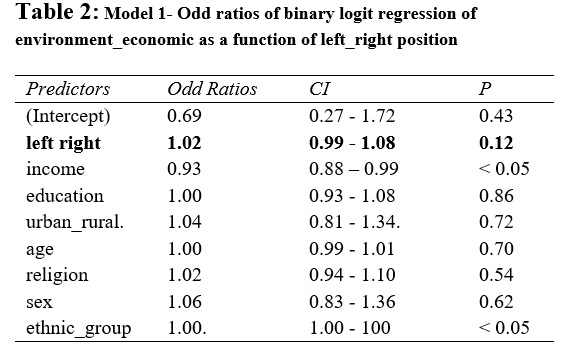
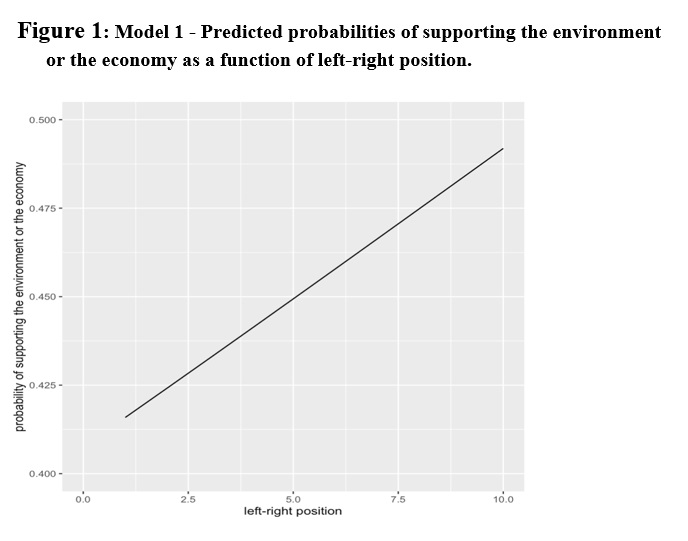
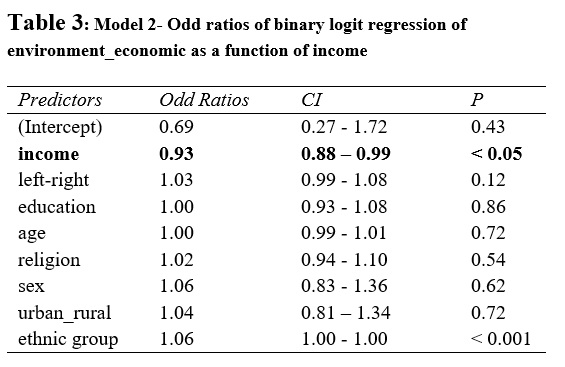
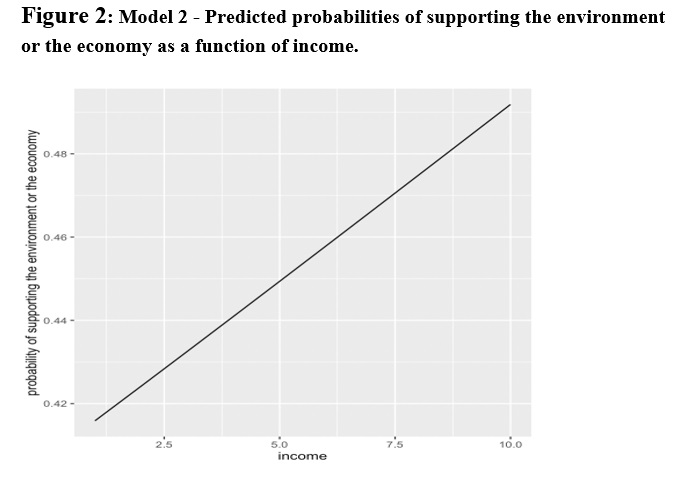
B). Variables of interest
Q111, Q240, Q288, Q275, Q262, Q289, Q290, Q260, H_URBRURAL.
Dependent variable survey question:
Here are two statements people sometimes make when discussing the environment. Which of them comes closer to your own point of view? A). Protecting the environment should be given priority, even if it causes slower economic growth and some loss of jobs. B). Economic growth and creating jobs should be the top priority, even if the environment suffers to some extent.
Coding:
1 (protecting environment), 2 (economy growth and creating jobs). I recorded them to 0 (protecting environment), and 1(economic growth).
C). Multicollinearity Test (Variance Inflation Factor)
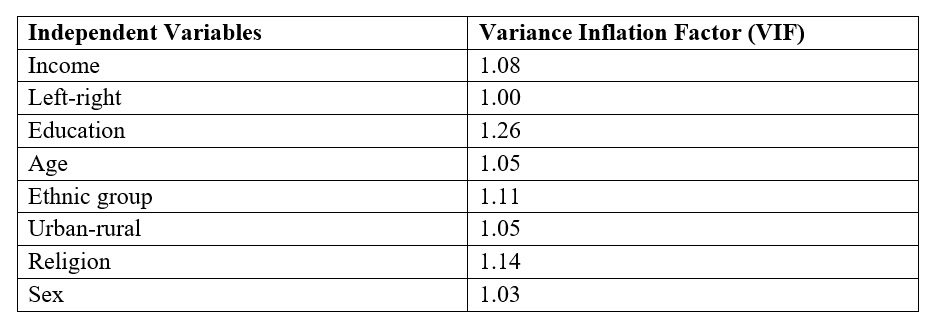
D). Summary of the variables used in the regression models
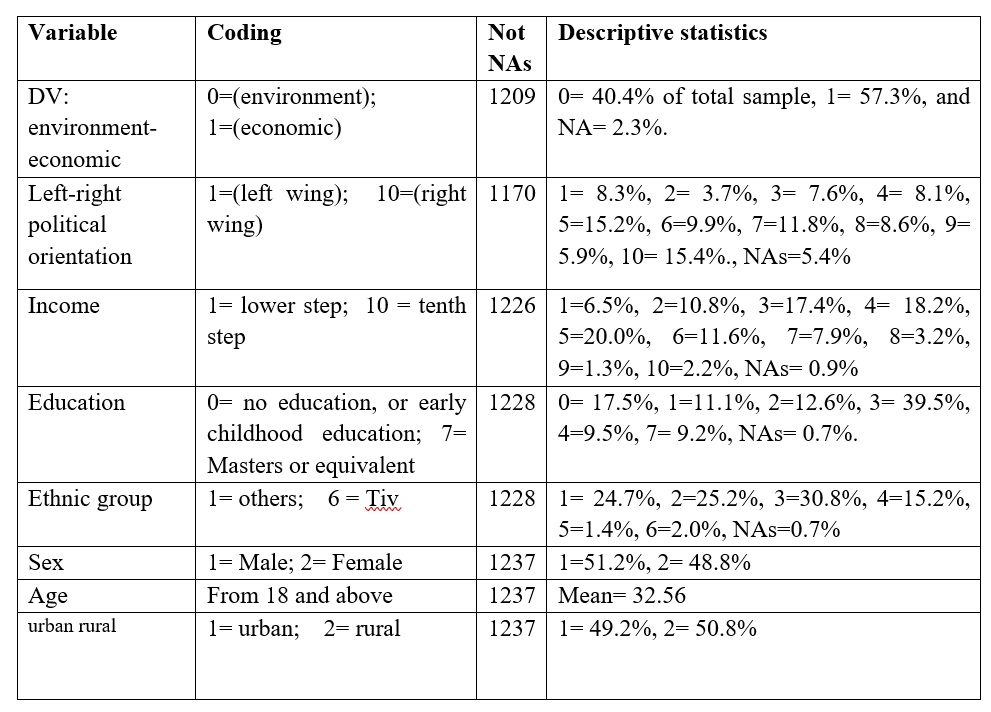
Bibliography
Adejobi, O., & Fatile, O. (2012). Climate Change, Environment and Conflicts in Nigeria. British Journal of Arts and Social Sciences ISSN: 2046-9578.
Alaanuloluwa Ikhuoso, O., Adegbeye, M. J., Elghandour, M. M. Y., Mellado, M., Al-Dobaib, S. N., & Salem, A. Z. M. (2020). Climate change and agriculture: The competition for limited resources amidst crop farmers-livestock herding conflict in Nigeria – A review. Journal of Cleaner Production, 272, 123104. https://doi.org/10.1016/j.jclepro.2020.123104
Ali, S. N. (2012, February 1). Climate Change and Economic Growth in a Rain-fed Economy: How Much Does Rainfall Variability Cost Ethiopia? Africa Portal; Ethiopian Economics Association (EEA). https://www.africaportal.org/publications/climate-change-and-economic-growth-in-a-rain-fed-economy-how-much-does-rainfall-variability-cost-ethiopia/
Begum, R. A., & Pereira, J. J. (2015). The awareness, perception and motivational analysis of climate change and business perspectives in Malaysia. Mitigation and Adaptation Strategies for Global Change, 20(3), 361–370. https://doi.org/10.1007/s11027-013-9495-6
Bowen, A., Cochrane, S., & Fankhauser, S. (2012). Climate change, adaptation and economic growth. Climatic Change, 113(2), 95–106. https://doi.org/10.1007/s10584-011-0346-8
Chou, K. T. (2013). The public perception of climate change in Taiwan and its paradigm shift. Energy Policy, 61, 1252–1260. https://doi.org/10.1016/j.enpol.2013.06.016
Dell, M., Jones, B. F., & Olken, B. A. (2012). Temperature Shocks and Economic Growth: Evidence from the Last Half Century. American Economic Journal: Macroeconomics, 4(3), 66–95. https://doi.org/10.1257/mac.4.3.66
Edeh, H. C., Leo-Nnoli, T. C., & Eme, I. O. (2014). The Political Economy of Climate Change in Africa: Nigeria in Perspective. Nigerian Chapter of Arabian Journal of Business and Management Review, 2(7), 18–29. https://doi.org/10.12816/0011607
Egan, P. J., & Mullin, M. (2012). Turning Personal Experience into Political Attitudes: The Effect of Local Weather on Americans’ Perceptions about Global Warming. The Journal of Politics, 74(3), 796–809. https://doi.org/10.1017/S0022381612000448
Elfredah, K.-A. (2020). ‘Our Community Has Been Suffering’: Total Abandons Nigerian Hospital Built as Compensation for Gas Pipeline Explosion. DeSmog UK. https://www.desmog.co.uk/2020/03/20/total-abandon-nigeria-hospital
Elum, Z. A., Modise, D. M., & Marr, A. (2017). Farmer’s perception of climate change and responsive strategies in three selected provinces of South Africa. Climate Risk Management, 16, 246–257. https://doi.org/10.1016/j.crm.2016.11.001
Emodi, N., & Ekene, N. (2016). Climate Change and Its Impact in Nigerian Economy. Journal of Scientific Research & Reports, 10, 1–13. https://doi.org/10.9734/JSRR/2016/25162
Ezegwu, C. (2014). Climate Change in Nigeria: The Impacts and Adaptation Strategies (SSRN Scholarly Paper ID 2543940). Social Science Research Network. https://doi.org/10.2139/ssrn.2543940
Hamilton, L. C. (2011). Education, politics and opinions about climate change evidence for interaction effects. Climatic Change, 104(2), 231–242. https://doi.org/10.1007/s10584-010-9957-8
Haque, M. A., Yamamoto, S. S., Malik, A. A., & Sauerborn, R. (2012). Households’ perception of climate change and human health risks: A community perspective. Environmental Health, 11(1), 1. https://doi.org/10.1186/1476-069X-11-1
Intergovernmental Panel on Climate Change. (2014). Climate Change 2014 – Impacts, Adaptation and Vulnerability: Part B: Regional Aspects: Working Group II Contribution to the IPCC Fifth Assessment Report: Volume 2: Regional Aspects (Vol. 2). Cambridge University Press. https://doi.org/10.1017/CBO9781107415386
International Crisis Group. (2020, September 28). Climate Change Doesn’t Have to Stoke Conflict. Crisis Group. https://www.crisisgroup.org/global/climate-change-doesnt-have-stoke-conflict
Islam, S. N., & Winkel, J. (2017). Climate Change and Social Inequality. 32.
James, G., Witten, D., Hastie, T., & Tibshirani, R. (2013). An Introduction to Statistical Learning: With Applications in R. Springer-Verlag. https://doi.org/10.1007/978-1-4614-7138-7
Kais, S. M., & Islam, M. S. (2019). Perception of Climate Change in Shrimp-Farming Communities in Bangladesh: A Critical Assessment. International Journal of Environmental Research and Public Health, 16(4), 672. https://doi.org/10.3390/ijerph16040672
Knight, K. W. (2016). Public awareness and perception of climate change: A quantitative cross-national study. Environmental Sociology, 2(1), 101–113. https://doi.org/10.1080/23251042.2015.1128055
List, J. A., & Kunce, M. (2000). Environmental Protection and Economic Growth: What Do the Residuals Tell Us? Land Economics, 76(2), 267–282. https://doi.org/10.2307/3147228
Lo, A. Y., & Chow, A. T. (2015). The relationship between climate change concern and national wealth. Climatic Change, 131(2), 335–348. https://doi.org/10.1007/s10584-015-1378-2
Maikasuwa, S. A. (2013). CLIMATE CHANGE AND DEVELOPING COUNTRIES: ISSUES AND POLICY IMPLICATION. 1, 10.
McCright, A. M., & Dunlap, R. E. (2011). Cool dudes: The denial of climate change among conservative white males in the United States. Global Environmental Change, 21(4), 1163–1172. https://doi.org/10.1016/j.gloenvcha.2011.06.003
Papoulis, D., Kaika, D., Bampatsou, C., & Zervas, E. (2015). Public Perception of Climate Change in a Period of Economic Crisis. Climate, 3(3), 715–726. https://doi.org/10.3390/cli3030715
Pindyck, R. (2011). Fat Tails, Thin Tails, and Climate Change Policy. Review of Environmental Economics and Policy, 5(2), 258–274. https://econpapers.repec.org/article/ouprenvpo/v_3a5_3ay_3a2011_3ai_3a2_3ap_3a258-274.htm
Reddy, B. S., & Assenza, G. B. (2009). Climate change—A developing country perspective. 14.
Sayne, A. (2011). Climate Change Adaptation and Conflict in Nigeria. 16.
Skoufias, E., & Bank, the W. (2012). The poverty and welfare impacts of climate change quantifying the effects, identifying the adaptation strategies. World Bank. https://openknowledge.worldbank.org/bitstream/handle/10986/9384/714510PUB097800C0disclosed070250120.pdf?sequence=1
World Bank. (2010). World development report 2010: Development and climate change [Text/HTML]. World Bank. https://documents.worldbank.org/en/publication/documents-reports/documentdetail/201001468159913657/World-development-report-2010-development-and-climate-change
Ziegler, A. (2017). Political orientation, environmental values, and climate change beliefs and attitudes: An empirical cross-country analysis. Energy Economics, 63, 144–153. https://doi.org/10.1016/j.eneco.2017.01.022
Further Reading on E-International Relations
- The UNSDGs and Transition to a Sustainable Economy through Post-growth Approach
- Bargaining for Protection – the Case of Climate Refugees
- Do Human Rights Protect or Threaten Security?
- Confucianism or Legalism? A Grand Debate on Human Nature and Economic Thought
- The Prisoner’s Dilemma in Environmental Politics: One Model to Rule Them All?
- From Environmental Scarcity to ‘Rage of the Rich’ – Causes of Conflict in Mali